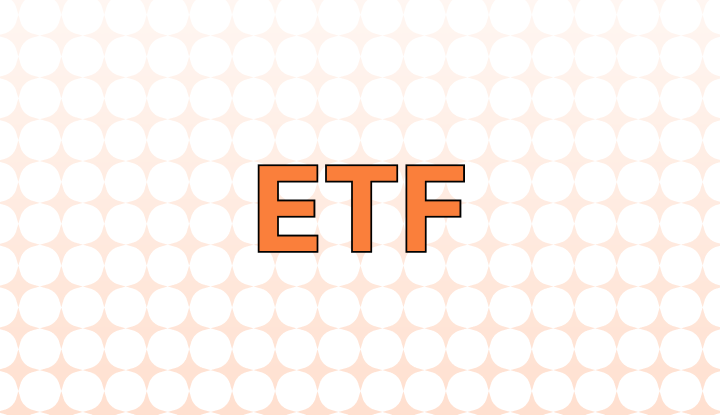「ETF」は「Exchange Traded Fund」の略語です。
- 上場投資信託を意味します。
- 一般的な投資信託とは違って取引所に上場しているため、個別の株式と同じように、証券会社を通じて取引所で売買することができるという点が最大の特徴です。
- ETFと投資信託(インデックスファンド)の最大の違いは、投資信託は1日1回算出される基準価額でしか取引できないのに対して、ETFは取引所の取引時間内に株式と同様に市場の動きを見ながらリアルタイムで取引することができることです。
ネイティブはいつ「ETF」を使いますか?
- An ETF is a type of investment fund that holds a collection of assets like stocks or bonds.(ETFは株式や債券の母音を含む投資の一種である。)
- ETFs have become popular among both novice and experienced investors due to their simplicity and versatility. (ETFは簡単さと多用途性で入門投資家と熟練した投資家の両方に人気を得るようになった。)
- Unlike mutual funds, ETFs can be bought and sold throughout the trading day. (ミューチュアルファンドとは異なり、ETFは取引日中に売買することができる。)
- The ETF industry has grown significantly in recent years, offering a wide range of options. (ETF 産業はここ数年かなり成長し、多様な選択肢を提供するようになった。)
- I'm considering investing in an ETF that tracks the performance of the technology sector. (私は技術産業の成果を追跡するETFに投資することを検討している。)
連関表現
- Stock: 株式
- Bond:債券
- Liquidity:資金の流動性、換金性
例文
- The value of my portfolio increased when the company's stock prices soared. (その会社の株価が急騰した時、私のポートフォリオ価値が上昇した。)
- If you believe in a company's long-term growth, holding onto its stock might be a wise strategy. (会社の長期的成長に信頼があるときは、株式を持っていることが賢明な戦略かもしれない。)
- Governments and corporations issue bonds as a way to raise capital for various projects. (政府と企業は多様なプロジェクトに対する資本を集めるための方式の一つとして債券を発行する。)
- Investors often turn to government bonds for their perceived safety and stability.(投資家はたいてい知覚された安全と安定性のため政府債券を探す。)
- When you buy a bond, you are essentially lending money to the issuer.(債券を買う時は発行者にお金を貸すのと同じだ。)
- Real estate investments often lack liquidity compared to more easily tradable assets like stocks.(不動産投資は、たいてい株式のように簡単に取引できるものに比べて換金性が落ちる。)
- In times of economic uncertainty, investors may prioritize liquidity to quickly access funds if needed. (経済的に不確実な時期には、投資家が必要な時に早く資金を得られるよう換金性を優先順位とすることができる。)
まとめ
ネイティブのように間違いない英語で書きたいですか?AI英語文法チェッカーEngramをお試しください。AIがもっと自然で文脈に合う表現をお勧めしてくれます。
無料英文チェッカー / 英語校正 - Engram
Engramの無料英文チェッカーと英文校正ツールを使用して、翻訳機の物足りない結果を校正・添削してみましょう。 文法、正書法の誤りとあいまいな英語表現をAIが自然に校正します。

参考資料:
ETF 뜻과 예시
상장지수펀드를 의미합니다.사전에 따르면 ”특정지수를 모방한 포트폴리오를 구성하여 산출된 가격을 상장시킴으로써 주식처럼 자유롭게 거래되도록 설계된 지수상품”을 일컫습니다.쉽게 말하면 주식처럼 거래되는 펀드의 한 세트입니다.한 때 테슬라 주식만큼 한국인 해외주식 투자자가 많이 매수한 ‘TQQQ’도 ‘프로셰어즈 울트라프로 QQQ’라는 이름의 ETF입니다.

ETFとは?ETF(上場投資信託)のしくみやメリット・デメリット、投資信託との違いを解説 | NEXT FUNDS
ETFとは、日経平均株価やTOPIX、S&P500等の指数に連動するように運用されている投資信託の一種で、株式同様に売買できます。ETFのメリット・デメリット、東証ETFと米国ETFとの違いも説明します。

ETF 뜻과 예시
상장지수펀드를 의미합니다.사전에 따르면 ”특정지수를 모방한 포트폴리오를 구성하여 산출된 가격을 상장시킴으로써 주식처럼 자유롭게 거래되도록 설계된 지수상품”을 일컫습니다.쉽게 말하면 주식처럼 거래되는 펀드의 한 세트입니다.한 때 테슬라 주식만큼 한국인 해외주식 투자자가 많이 매수한 ‘TQQQ’도 ‘프로셰어즈 울트라프로 QQQ’라는 이름의 ETF입니다.

stock
1. a supply of something for use or sale: 2. the total amount of goods or the…

bond
1. a close connection joining two or more people: 2. an official paper given…

liquidity
1. the fact of being available in the form of money, rather than investments or…















